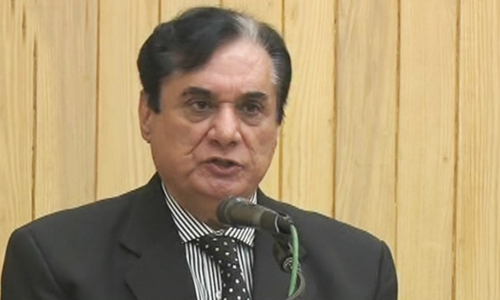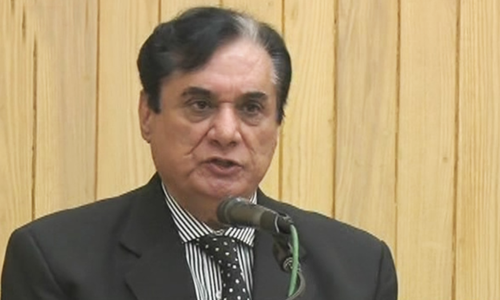ISLAMABAD: Senior members of the federal cabinet are expected to hammer out a set of proposals on Tuesday to shape them into a final draft bill for amending the National Accountability Ordinance (NAO) 1999, which include exploring avenues for removal of National Accountability Bureau (NAB) chairman during his four-year non-extendable term.
Information Minister Fawad Chaudhry told Dawn that Tuesday’s meeting will be presided over by Prime Minister Imran Khan. It is expected to be attended by Law Minister Barrister Dr Farogh Naseem, Attorney General for Pakistan (AGP) Khalid Jawed Khan, the information minister, Foreign Minister Shah Mahmood Qureshi, Minister for Planning and Development Asad Umar, Defence Minister Pervez Khattak and Education Minister Shafqat Mehmood.
A proposal envisages removal of NAB chairman during his tenure
The four-year tenure of the incumbent chairman of NAB Javed Iqbal is set to end in the second week of the current month. He had taken over the charge of his office on Oct 10, 2017. Mr Iqbal was appointed NAB chairman after the then PML-N government led by former prime minister Shahid Khaqan Abbasi and the then leader of the opposition Syed Khurshid Shah reached a consensus.
Two set of proposals for amending the NAO are being prepared, one by the law ministry and the other by the AGP office, on which the coming meeting will deliberate upon and come up with final approval.
The prime minister has assigned the task to Speaker National Assembly Asad Qaiser to engage the opposition leaders and invite them to also discuss proposed amendments to the NAB ordinance in a yet-to-be-formed electoral reforms committee of the National Assembly.
“But the major roadblock that comes in the way of any serious dialogue with the opposition is their concern over corruption references against their leaders than the issues confronting the country,” said Fawad Chaudhry.
Red Zone files: Who will be the next NAB chairman?
An informed source told Dawn that Tuesday’s huddle will also dwell on exploring how to remove NAB chairman in case he becomes incapable of properly performing his duties due to physical or mental incapacity or being guilty of misconduct. Currently the NAO is silent on the mechanism on removal of NAB chairman.
On Friday, Prime Minister Imran Khan during a similar meeting on the appointment of a new chairman of NAB or granting extension to the tenure of the incumbent chairman had felt that ignoring Leader of Opposition in the National Assembly Shehbaz Sharif in the entire process would render the exercise controversial, according to sources.
That was the reason why Pakistan Muslim League-Nawaz (PML-N) Senator Azam Tarar was informally approached in this regard. However, when contacted, Senator Tarar told Dawn that no proposal had yet been shared with the party nor any informal meeting had been arranged.
However, insiders in government circles believe that ensuring transparency in the process of appointment of NAB chairman, whether in written form or by holding formal consultation with Shehbaz Sharif is necessary.
Under Section 6(b) of the NAO, the president appoints NAB chairman in consultation with the leader of the house and the leader of opposition in the National Assembly for a non-extendable period of four years.
Though the idea is being resisted by certain government functionaries on the ground that consultation with the opposition leader is not necessary when he himself is facing a number of corruption references filed by NAB, saner elements argue that though Shehbaz Sharif has been accused of corruption, he has not been convicted. Besides leaving the opposition leader aside would create a negative impression especially when the law requires so.
There are also divergent views on the appointment of NAB chairman as the argument is also being advanced that the current chairman could be given extension in the office by treating the earlier approval of the leader of the opposition as consultation as well as amending clause (i) of sub-section (b) of Section 6 of the NAO and omitting the word non-extendable. This will annul the legal requirement of having consultation with the opposition leader.
Another proposal is to entitle the incumbent chairman to be a candidate for the office and remain in the run for the appointment of new NAB chairman in addition to the names which the government or the opposition may float, according to the sources. In this case, he will have to go through the appointment procedure afresh.
“Serious thought is being given to three individuals of whom one is a former senior judicial officer while two others are retired civil servants,” the sources said without sharing the names.
One of the proposals in the draft amendments requires the Supreme Judicial Council (SJC) to initiate proceedings against NAB chairman, like judges of superior courts, auditor general of Pakistan and federal ombudsman. Currently no forum is available for removal of NAB chairman.
On July 12, a SJC meeting had deferred further deliberations on a reference until the government comes up with a solution to the legal lacuna regarding removal of NAB chairman.
Then SJC hearing, which was presided over by Chief Justice of Pakistan Gulzar Ahmed, had taken up a 2019 reference moved by Advocate Chaudhry Mohammad Saeed Zafar against NAB Chairman Javed Iqbal against the backdrop of a leaked video clip showing alleged clandestine and illicit relations between Mr Iqbal and Tayyaba Gull, an accused in a NAB inquiry.
The proposals also suggest deleting Section 34 A of the NAO which allows NAB chairman to delegate his authority to his subordinates. The suggestion is being made in view of the complaints of misuse of the authority since under the law NAB chairman can delegate his powers to the bureau’s director generals of the provinces.
Similarly, the draft amendments also suggest taking out from the purview of the NAO the members of the cabinet, National Finance Commission, ECNEC, senior members of the boards of State Bank of Pakistan and different statutory bodies and corporations for procedural lapses or the decisions made in good faith unless there are clear allegations of taking monitory benefits.
Likewise, under the proposed amendments disputes on tax or revenue between the private citizens and the state will also be taken out of the purview of the bureau. Besides, an amendment will also be made to digitalise the process of recording of evidence through video and audio links etc.
Published in Dawn, October 3rd, 2021















































Dear visitor, the comments section is undergoing an overhaul and will return soon.